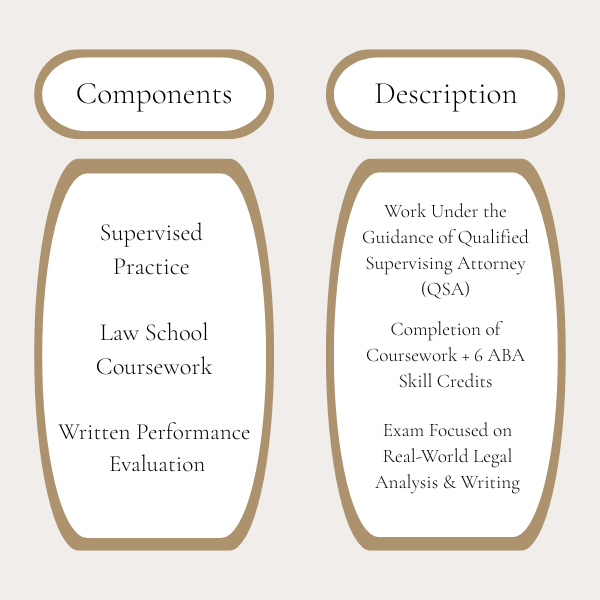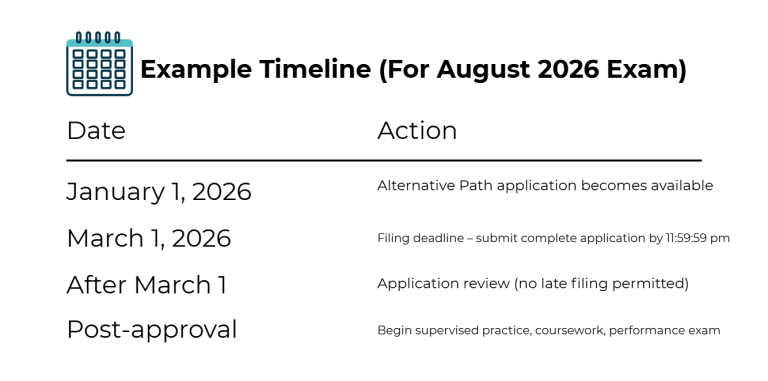Two Pathways: One Standard of Excellence
In Addition to the Bar Exam, an Alternate Pathway to Attorney Licensure that Emphasizes Competency, Flexibility, and Access is Now Offered.
What is the Alternate Pathway to Licensure?
The alternate pathway to attorney licensure in Utah is a skills-based route to becoming licensed, without taking the traditional Uniform Bar Exam (UBE). The bar exam remains an established way for attorney licensure in Utah, and it will continue to be available for all eligible law school graduates.
The added option toward licensure was developed by the Utah Supreme Court’s Working Group. It is a practice-based training that allows candidates to demonstrate their competence through a combination of:
- Supervised legal practice,
- Completion of specific law school skills courses, and
- Passing a written performance exam administered by the Utah State Bar.
This approach is designed to ensure law school gradates have the practical skills and knowledge needed to practice law effectively, while also reducing financial and logistical barriers often associated with bar exam preparation. Importantly, the alternate path does not replace the bar exam; it merely provides a licensure option for qualifying candidates.
*Applications for the Alternate Pathway open January 1, 2026.
Frequently Asked Questions
The COVID-19 pandemic prompted the Utah Supreme Court to issue a one-time order granting licensure to law school graduates of qualifying law schools without having to take the Uniform Bar Exam after the graduates had completed a specified number of supervised practice hours. After the order was issued, the Court created a Task Force to research the feasibility of assessing law graduates without the traditional bar exam. The Task Force spent the past five years researching and ultimately drafting a proposal for an alternate pathway to licensure, and the Utah Supreme Court believes the addition of this alternate pathway provides an equally effective method to measure the competency of new lawyers entering the legal profession. The proposal is based in large part of one of the most comprehensive studies of attorney minimum competence ever done: The Twelve Building Blocks of Minimum Competence. The study and its results can be found at
https://papers.ssrn.com/sol3/papers.cfm?abstract_id=3793580.
The alternate pathway differs from the current bar exam route because the alternate pathway does not require the candidate to sit for the traditional Uniform Bar Exam in Utah. Instead, the applicant seeking admission through the alternate pathway will be required to satisfy several requirements including earning passing grades in specified law school courses, completing supervised practice hours post-graduation, and passing a written exam.
While the Utah Supreme Court has approved the rule to allow the alternate pathway, the Utah State Bar will not start accepting applications for the alternate pathway until the development of the written exam is complete. The Court and the Utah State Bar believe this could happen as early as the summer of 2026.
The Utah Supreme Court intends for the alternate pathway to be a permanent route to licensure offered to all qualified applicants seeking to practice law in Utah.
The alternate pathway combines specific law school curriculum, supervised practice hours post-graduation, and a written exam focused on objective performance-based elements to ensure that there are multiple objective markers and assessors determining the competence and qualifications of the candidate. The Court is also committed to both short and long-term evaluations of the alternate pathway, its implementation, and those who select the alternate pathway to ensure that the program is effective.
The application process for the alternate pathway is the same for an individual applying for admission through any other route in Utah. Applicants will register for an account on admissions.utahbar.org to complete an online application and initiate the character and fitness review process. However, to be eligible for application, additional requirements must be met as not all applicants will qualify (for example, applicants who graduated outside the timeframe required by the rule or did not complete the required coursework).
Rule 14-703A outlines the qualifications required of those pursuing the alternate pathway.
Rule 14-703A outlines the course requirements for those pursuing the alternate pathway.
An applicant pursuing the alternate pathway will have 12 months to complete all requirements.
The alternate pathway is not an “easier” path to licensure than the Uniform Bar Exam. The alternate pathway and the Uniform Bar Exam are distinct but equal methods of assessing minimum attorney competence to practice law.
Each jurisdiction selects its own requirements for attorney licensure. As of now, the alternate pathway license is not a portable license to practice law.
Additional Resources
- Rule 14-703A
- Supervision Guidelines
- Related Article
- Uniform Bar Exam
Why Consider the Alternative Path?
Evidence-Based: Backed by data supporting skill-based assessment.
More Accessible: No bar prep course or time off work required.
Improved Readiness: Emphasizes practical legal skills.
Financially Efficient: Reduces the cost burden of licensure.
Responds to Bar Exam Limitations: Especially in light of the upcoming NextGen Bar Exam.
You Plan to Practice Law in Utah
How It Works

“We believe this new path complements—not competes with—the traditional bar exam.” – The Working Group
(The Working Group is made up of 15 members representing a cross-section of Utah’s legal community, including judges, practitioners, and academics.)
Application Steps & Deadlines:
Applications open January 1, 2026.
The filing deadline is March 1 for the August 2026 exam.
No late applications are accepted, as per Rule 14‑707
*Applications for the Alternate Pathway Open
January 1, 2026.

For Legal Professionals
Qualifying supervising attorneys (QSA) play a key role in Utah’s Alternate Pathway to Licensure. By supervising new graduates, they help future lawyers build the real-world skills, ethics, and judgment needed to practice law. This role allows experienced attorneys to give back to the profession, support the next generation, and contribute to a more practical and accessible route to becoming a lawyer.
Who Can Become a QSA & Required Duties
Must be a licensed attorney in good standing, authorized to practice law in Utah.
Must be willing to:
Ensure the aspiring lawyer completes required 240 hours of supervised practice appropriately.
Impart professionalism, ethics, civility, and service values.
Record supervised hours in one-tenth hour increments and submit them.
At completion, must attest to the accuracy of the hours logged. If multiple attorneys were involved, each must sign off on their portion.
Supervising attorneys may delegate certain responsibilities but remain fully responsible for all licensed work performed under their supervision.
In many court settings, the supervising attorney must be personally present (e.g., felony or Class A criminal matters), but other situations (e.g., non‑trial civil appearances) may allow delegation with proper consent.

*QSA Applications Available
January 1, 2026.
“We don’t accomplish anything in this world alone… whatever happens is the result of the whole tapestry of one’s life and all the weavings of individual threads from one to another that creates something.”
~ U.S. Supreme Court Justice Sandra Day O’Connor

“As a member of Utah’s Working Group on Attorney Licensure for the past five years, I have been impressed by the Court’s careful consideration of whether an alternate path to licensure should be offered in Utah. The Court’s approved alternate path is grounded in the two most comprehensive studies ever done on the skills required of a minimally competent attorney. It is more inclusive than any previous or existing licensure system in the United States in what it assesses, and it also requires a testing component that actually reflects what attorneys do in legal practice. Drawing from extensive experience working on national Bar reform efforts, I firmly believe Utah’s new alternate path is foundationally sound, comprehensive in scope, refreshingly evidence-based, and more aligned with the realities of legal practice than any other licensure system in the nation.”
~ Catherine Bramble
Associate Professor, BYU Law School